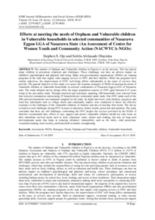ABSTRACT: The number of Orphans and Vulnerable children in Nigeria is on the increase. This has placed many children in precarious situations and challenges. These challenges can have an adverse impact on children‟s psychological and physical well-being. Many non-governmental organizations (NGOs) are running programs in the state that supply wide-ranging services to OVC and their families. While the programs have similar objectives, the improvement of OVC well-being differs substantially in the types of services they provide. The general objective of this study is to assess the response strategies of NGOs in meeting the needs of vulnerable children in vulnerable households in selected communities of Nasarawa Eggon LGA of Nasarawa state. The study adopted survey design while the target population consists of OVC aged between 0-17 years living in the area under study. Through clustered and systematic sampling, 100 households were selected from four selected communities representing 25 households per community under study. One OVC under each of the 100 selected households was randomly sampled for the study. In-depth interviews with children, caregivers and local key informants such as village chiefs and community leaders were conducted to know the effective responses to the challenges of the vulnerable children; of families and also in meeting their needs. The survey revealed several challenges facing OVC in areas of education, shelter, health, protection and nutrition. The study concludes that there are still challenges confronting the OVC despite the services provided by the NGOs. It therefore recommends that, efforts to care, support and protect vulnerable children should not only focus on their immediate survival needs such as food, education, water, shelter and clothing, but also on long-term developmental needs that helps in reducing children's vulnerability such as life skills, child protection, vocational training, food security, and household economic strengthening.

